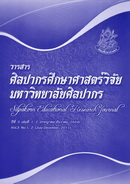การพัฒนารูปแบบการดูแลให้คำปรึกษาแนะนำเพื่อส่งเสริมสมรรถนะการสอน และการทำวิจัยในชั้นเรียนของนิสิตฝึกประสบการณ์วิชาชีพครูสาขาการสอนคณิตศาสตร์
บทคัดย่อ
บทคัดย่อ
การวิจัยครั้งนี้มีวัตถุประสงค์ เพื่อ (1) เพื่อพัฒนารูปแบบการดูแลให้คำปรึกษาแนะนำเพื่อส่งเสริม สมรรถนะการสอนและการวิจัยในชั้นเรียนของนิสิตฝึกประสบการณ์วิชาชีพครู สาขาวิชาการสอนคณิตศาสตร์ และ (2) ตรวจสอบประสิทธิภาพเชิงประจักษ์ของรูปแบบที่พัฒนาขึ้น กลุ่มตัวอย่างเป็นอาจารย์นิเทศก์ มหาวิทยาลัยเกษตรศาสตร์ วิทยาเขตกำแพงแสน จำนวน 4 คน นิสิตฝึกประสบการณ์วิชาชีพครู สาขาการ สอนคณิตศาสตร์ มหาวิทยาลัยเกษตรศาสตร์ วิทยาเขตกำแพงแสน จำนวน 10 คน และนักเรียน จำนวน 488 คน เครื่องมือที่ใช้ในการวิจัย คือ แบบทดสอบ แบบประเมิน แบบบันทึก แบบสังเกต แบบสอบถามและ การสนทนากลุ่ม วิเคราะห์ข้อมูลโดยใช้ค่าเฉลี่ย ค่าร้อยละ ส่วนเบี่ยงเบนมาตรฐาน ทดสอบค่าที และการ วิเคราะห์เนื้อหา ผลการวิจัย พบว่า รูปแบบการดูแลให้คำปรึกษาแนะนำพีพีเอ็มอี (PPME Mentoring Model) ประกอบด้วย 3 องค์ประกอบกับหลักการและวัตถุประสงค์ องค์ประกอบเชิงกระบวนการได้แก่ ระยะเตรียม การ (Preparing) ระยะวางแผน (Planning) ระยะดูแลให้คำปรึกษาแนะนำ (Mentoring) ระยะประเมินผล (Evaluating) และองค์ประกอบเชิงระบบสนับสนุนของรูปแบบ นอกจากนี้หลังการทดลองพบว่าสมรรถนะ การดูแลให้คำปรึกษาแนะนำของอาจารย์นิเทศก์ สมรรถนะการสอนและการวิจัยในชั้นเรียนของนิสิตอยู่ใน ระดับสูงมาก อาจารย์นิเทศก์มีความพึงพอใจต่อรูปแบบอยู่ในระดับมากที่สุด นิสิตมีความคิดเห็นต่อการดูแล ให้คำปรึกษาแนะนำของอาจารย์นิเทศก์ในระดับมากที่สุด และผลสัมฤทธิ์ของนักเรียนก่อนและหลังเรียน แตกต่างกันอย่างมีนัยสำคัญทางสถิติที่ระดับ .05
Abstract
The purposes of this research were to: develop a mentoring model to enhance pre-service mathematics teachers competency in teaching and conducting classroom action research and empirically examine effectiveness of the model. The subjects were 4 supervising teachers at Kasetsert University, Kamphangsaen Campus, 10 pre-service mathematics teachers in Kasetsart University, Kamphangsaen Campus and 488 students. The research instruments were an achievement test, an evaluation form, a record form, an observation form, a questionnaire and focus group discussions. The data were analyzed by mean, percentage, standard deviation, dependent t-test and content analysis. The research results revemled that the “PPME Mentoring Model” which consisted of 3 components: principles and objectives , process component including Preparing Phase, Planning Phase, Mentoring Phase and Evaluating Phase and support system components. After the implementation of the model, supervising teachers’ mentoring competence and pre-service teacher’ competence in teaching and conducting classroom action research were at the high level. Supervising teachers were satisfied with the model at the highest level. Preservice teachers were satisfied with mentoring at the highest level. Students’ learning achievement before and after the implementation of the model were significantly different at the level of .05.





